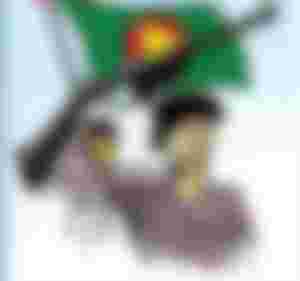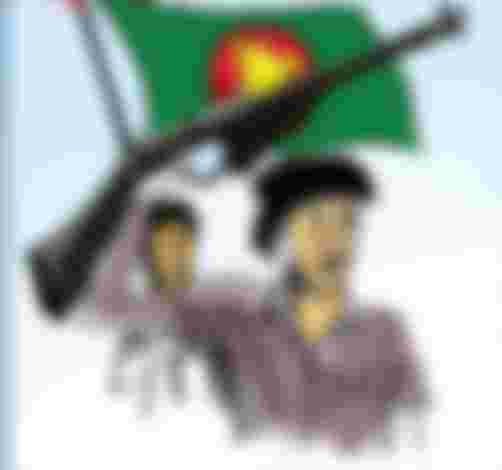As long as Padma-Meghna-Gauri-Jamuna flows in Rabe, so long is your Sheikh Mujibur Rahman. Short biography of Bangabandhu:

Birth:
Bangabandhu Sheikh Mujibur Rahman was born on 17 March 1920 in Tungipara village of Patgati union in Gopalganj subdivision of Faridpur district. His father Sheikh Lutfar Rahman was the Serestadar of Gopalganj Sessions Court (who preserves the accounts of the court). Mother Saira Khatun. Mujib was the third child of the couple's four daughters and two sons. His elder sister Fatema Begum, elder sister Asiya Begum, Sage sister Helen and younger sister Laili; his younger brother's name is Sheikh Abu Nasser. Education:
Sheikh Mujib started his education at Gimadanga Primary School in 1926 at the age of eight. He was admitted to Gopalganj Public School in 1929 at the age of 9. After completing 5 years of education here, Mujib was admitted to the seventh class of Gopalganj Mathuranath Institute Mission School in 1936. Political and working life:
From a young age, his political talents began to show. In 1940, he joined the All India Muslim Students Federation, a student organization of the All India Muslim League. The radical left the organization and joined the liberal and progressive Bengal Muslim League in 1943. It was here that Hussain Shaheed Suhrawardy came close. On 4 January 1947, he formed the East Pakistan Muslim Chhatra League. He was one of its founders. The fifties were the period of his political rise. Gradually he became a visionary political leader. At this time Sheikh Mujib left the "Muslim League" and formed the "Awami Muslim League" together with Hussain Suhrawardy and Maulana Bhasani. State Language Movement:
Sheikh Mujibur Rahman played a very important role as a political leader during the language movement. In 1948, under his leadership, the first protests and student strikes on the language issue began, which culminated on 21 February 1952. As a result, the Bengali nation today speaks Bengali.

6 points:
A national conference of opposition parties was held on 5 February 1966 in Lahore. It was at this conference that Sheikh Mujib presented his historic six-point demand for a full outline of the autonomy of East Pakistan. 11-point demand and Bangabandhu title:
Sheikh Mujibur Rahman was given a public reception on 23 February 1969 at the Race Course Ground in Dhaka on the initiative of the Central Student Struggle Council. Agartala conspiracy case:
In early 1968, the Pakistani government filed a case against Sheikh Mujib and 34 other Bengali military and CSP officers in what became known as the Agartala Conspiracy Case.
In a public meeting held on 5 December 1969, Bangabandhu Sheikh Mujib named East Bengal 'Bangladesh'. He said, "Once upon a time, an attempt was made to erase the last trace of the word 'Bangla' from the pages of this country, from the pages of the map. Election of the 70's:
- In the general election on December 7, 1970, the Awami League under the leadership of Sheikh Mujibur Rahman won an absolute majority in the provincial legislature. In the then East Pakistan, the Awami League won 16 out of 189 seats in the National Assembly and 305 out of 310 seats in the Provincial Assembly. March 7 speech: ৭https: //youtu.be/Wh0q8vdH-ro
Bangabandhu Sheikh Mujibur Rahman called for independence in a historic speech on March 7, 1971 at the Racecourse Ground. In the crowd of the racecourse, Bangabandhu declared, "This time the struggle is for our liberation, this time the struggle is for freedom." In this historic speech, Father of the Nation Bangabandhu called upon the Bengali nation to release the chains and declared, “When I have given blood, I will give more blood. I will release the people of this country inshallah. Everyone built forts from house to house. We have to deal with the enemy with whatever we have. ”The formation of the government and the election of the President:
The first government of the People's Republic of Bangladesh was formed on 17 April 1971 and Sheikh Mujib was made the President.

At the call of Bangabandhu, the whole of Bengal became agitated. Frightened by the awakening of the Bengali nation under the leadership of Mujib, Yahya Khan imposed martial law, banned the Awami League and ordered the arrest of Sheikh Mujib. Then, in the darkness of the night of March 25, 1971, the Pakistani army jumped like hyenas on the innocent unarmed Bengalis; Operation Searchlight is the worst massacre in the history of history. On 25 March 1971, Bangabandhu Sheikh Mujibur Rahman was arrested by the Pakistan Army from his residence in Dhanmondi. After a long and bloody battle of nine months, victory finally came at the cost of the lives of 3 million Bengalis. On 16 December, the Pakistani army surrendered to the Bangladesh-India ally at the Suhrawardy Udyan from which Bangabandhu had called for the freedom struggle. A new country called Bangladesh was born on the map of the world.

Homecoming, formation of government and establishment of Bakshal:
On 10 January 1972, Bangabandhu returned to his beloved motherland Bengal. Returning to the country, Bangabandhu jumped into rebuilding the war-torn country. He appealed for international help in dealing with humanitarian disasters. Bangladesh became the Prime Minister of Bangladesh on 12 January. During his rule, 104 countries recognized Bangladesh. Death:
At midnight on 15 August 1975, a group of misguided army officers killed Bangabandhu Sheikh Mujibur Rahman and his family members. Only his two daughters Sheikh Hasina and Sheikh Rehana survived because they were out of the country at that time. This heinous massacre brought irreparable damage to the life of the newly independent Bengali nation. Political vacuum is created in the country, the trend of democratic development is disrupted. The damage done to the Bengali nation by killing Bangabandhu will never be compensated



He's The man Who's bring up justice in our country..